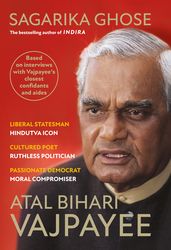It was the height of the BJP’s rath yatra in 1990. Chief ministers Lalu Prasad of Bihar and Jyoti Basu of West Bengal met Atal Bihari Vajpayee and urged him to ask Advani to stop the yatra. Vajpayee called Advani and said, “Advani ji, perhaps you should call off your yatra now? Problems are being created.”
Advani replied that it had become very popular and that crowds were flocking to it. “Popular, is it?” Vajpayee said. “All right then, carry on.”
“If the platform was popular, it acquired its own morality,” writes Sagarika Ghose in her new book Atal Bihari Vajpayee. Fast-paced, filled with anecdotes, and absorbing, Ghose’s biography attempts—and succeeds—in portraying a complex man, ambitious but ultimately a committed parliamentarian. As Ghose writes, Vajpayee’s career spanned the length of post-Independent India. He began his electoral career in 1955 and continued till 2004. He was the man who made hindutva palatable.
The book explores his contradictions—an RSS man who was a kuwara (bachelor) but not a brahmachari, and a poet who in high school delivered the high-octane “Hindu tan man, Hindu jeevan, rag rag Hindu mera parichay... [My body and soul are Hindu, my life is Hindu, entire being is Hindu, Hindu is my identity], which is almost a hindutva motto, as well as ‘Jung naa hone denge’ [We will not allow war], which he recited on a visit to Lahore in 1999, very much embodying liberal India. Ghose vividly portrays the man who could straddle these disparate worlds. It is not, however, a white-washing.
Vajpayee had indeed been a Sangh man, but Ghose writes—quoting N.K. Singh, former secretary in the Vajpayee PMO—that he “dealt with the RSS very deftly, keeping them at arm’s length”. Tracing his journey from his early days to him becoming prime minister in his twilight years, Ghose also delves into the personal—such as Vajpayee’s relationship with Mrs Kaul, whom he did not marry, but lived along with her husband; his adopted daughter Namita, whom he depended on.
It is in reconstructing his friendships and his personal life that Ghose offers a real peek into his life. His friendships cut across party lines—from Hiren Mukherjee and Indrajit Gupta to P.V. Narashima Rao, C.N. Annadurai and George Fernandes. She also offers insights into his fruitful partnership with Advani—a relationship that Vajpayee never referred to as friendship. The biography, as Ghose writes, uncovers “little-known facets of the complicated personality beneath the myths”.
This is not her first biography. Ghose’s portrait of Indira Gandhi, another politician who looms large in Indian history, has given her the understanding to provide context for a period of great churning in post-Independent India. And while trying to understand Vajpayee, Ghose also tries to shape his doctrine—Vajpayeeism, as she calls it—as the opposite of the modern-day Moditva. It is very much a book of an era gone by, one that is essential to understanding India today.
Atal Bihari Vajpayee
By Sagarika Ghose
Publisher: Juggernaut
Price Rs799, pages 414


